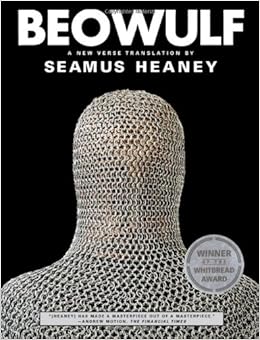Venturing closer,
his talon was raised to attack Beowulf
where he lay on the bed; he was bearing in
with open claw when the alert hero's
comeback and armlock forestalled him utterly.
The captain of evil discovered himself
in a handgrip harder than anything
he had ever encountered in any men
on the face of the earth. Every bone in his body
quailed and recoiled, but he could not descape.
He was desperate to flee to his den and hide
with the devil's litter, for in all his days
he had never been clamped or cornered like that.
Beowulf is the original badass. His name means BEE WOLF, for Pete's sake. The Old English epic poem is about three of Beowulf's most badass accomplishments: first, he travels from his homeland among the Geats to save the Danes from the monster Grendel who is devouring them at night (out of jealousy for how sweet the king's hall is, no less). Then, when Grendel's mother attacks the Danes for revenge over her son's death (you may remember her as Angelina Jolie) he goes underwater and kills her, too. Then, after returning to Geatland and reigning for fifty years, he defeats a gold-hording dragon, though he dies in the process.
The dragon bit should sound familiar; Tolkien--who famously brought critical attention back to Beowulf--clearly modeled The Hobbit's Smaug after it. Much of modern fantasy fiction, in a way, with its uncomplicated heroism and reliance of British mythological themes, is basically cribbed from Beowulf.
Heaney's translation, which seems to have become fairly canonical, is a great accomplishment. Heaney's poetry, which has always been very workmanlike and straightforward, is a good match for the earthy tone and subject matter of Beowulf, and strips the poem of its English 101 associations. In his foreword, Heaney talks about his decisions to adapt some of the language of his working-class Irish background into his translation, which he traces back to the recognition of the Old English root tholian in the Irish slang thole, to suffer. In this way Heaney's work adds merely another layer to a complex stack of temporal and geographical influences: Beowulf is a poem written in England about Denmark and Sweden and given an Irish inflection by Heaney. The subtle conflict between the author's Christianity and his subject's paganism, too, testifies to Beowulf as the unique product of different cultures. But it also emphasizes the universality, and the plain adventurous fun, of the story.


8 comments:
I love love love Seamus Heaney's translation. He has convinced me that the only appropriate word to start an epic with is "So." One of my favorite classes for grad school was Old English (it was supposed to include Middle English but my professor thought Middle English was too contemporary) which was really surprising considering my general reading interests.
Am I a bad person for not being that interested in Beowulf?
(and, feel free to call me a hypocrite for sitting through Hero of a Thousand Faces but not this...)
I tried, I really tried to read this, but I just failed. I was sure that this would be the translation that would hook me, but it just didn't.
Fun fact: I've had 3 translations of Beowulf fall into the toilet, including this one. Consequently I have never finished it.
This translation is beautiful: it's how I was introduced to Beowulf. I also think it's more difficult. My team (sadly) insisted on the Raffel translation when I was teaching. I think it keeps the fun, loses the beauty. Heaney all the way!
Randy: yes.
Randy: yes.
Randy: flush.
Post a Comment